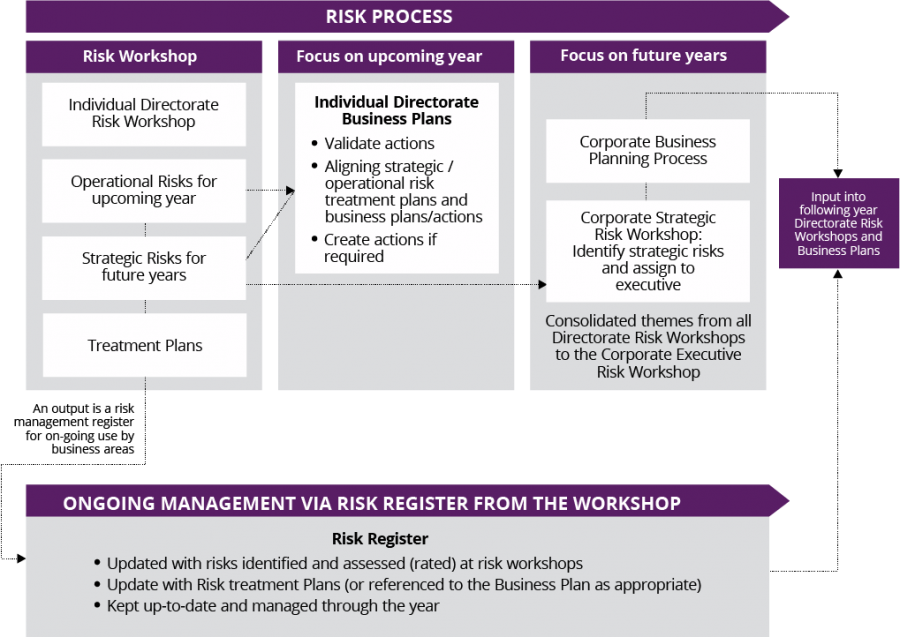Corporate Executive
Corporate Executive is our peak decision-making body. Its objective is to ‘set clear strategic direction to deliver government priorities, meet our aspiration, purpose and achieve agreed performance goals’. It has a charter that identifies its role, outcomes and responsibilities.
A profile of each member of the Corporate Executive is included in the Leadership section of this report.
The Managing Director has a performance agreement with the Commissioner, while all members of Corporate Executive have performance agreements with the Managing Director.
|
Some of the key focus areas of Corporate Executive during the past year included: |
|
Main Roads has five executive committees capably and professionally supporting our Corporate Executive.
Management Review and Audit Committee
This committee ensures appropriate management practices and controls are in place, leading to efficient and effective business performance. It provides independent, objective assurance and advice and reports on a quarterly basis.
|
Role
|
Executive Members
|
|
Some of the key focus areas of Corporate Executive during the past year included: |
|
|
|
Budget Committee
This committee meets monthly with the objective of ensuring financial management oversight and best use of funds to achieve our strategic outcomes.
Some of the key focus areas of the committee during the past year included:
|
Role
|
Executive Members:
|
|
Some of the key focus areas of Corporate Executive during the past year included: |
|
|
|
Corporate Safety, Health and Wellbeing Committee
This committee is part of the high-level governance arrangement reflecting the importance we place on the safety of our workforce; the committee is chaired by the Executive Director Human Resources. It also includes the Safety, Health and Wellbeing Manager and Manager Communities of Expertise along with safety representatives from each Directorate.
|
Role
|
Executive Members
|
|
Some of the key focus areas of Corporate Executive during the past year included: |
|
|
|
More information on our health and safety activities is included in the Safety, Health and Wellbeing section.
Asset Management Committee
The objective of this committee is to guide the development, implementation and operation of our Asset Management System to meet the needs of our strategic direction.
|
Role
|
Executive Members
|
|
Some of the key focus areas of Corporate Executive during the past year included: |
|
|
|
Investment Committee
This committee is the peak decision-making body for strategic network development strategy and investment planning, and for overseeing development of the Ten-Year Investment Plan.
|
Role
|
Executive Members
|
|
Some of the key focus areas of Corporate Executive during the past year included: |
|
|
|
Risk Management
Risk is inherent in everything we do; risk management is a continuous function affecting all facets of our
lives and is something we act upon either consciously or subconsciously. From an organisational viewpoint, systematic management of risk is crucial at all levels whether it be from a strategic viewpoint or in our day-to- day operations.
Our risk management approach aligns with the context within which we operate, taking account of regulatory, financial, safety, political and economic compliance requirements; reputational exposures; community expectations; and other governance needs. We adopt AS/NZS 31000: 2009 Risk Management – Principles and Guidelines Standard as our approach for managing risk.
Portfolio-wide Risk Management Policy
We have continued to adopt the Portfolio-wide Risk Management Policy. This policy was developed in 2018 in collaboration with our portfolio partners and approved by the Corporate Executive and Transport Portfolio Governance Council. A single approach allows for consistency and tracking of high-level risk assessment and prioritisation across the three agencies.
Corporate Risk Management
Main Roads’ corporate strategic risk assessment is embedded in the corporate business planning process. This enables resources to be spent on risk management as opposed to risk administration. Corporate strategic risk workshops for all Main Roads directorates and the Corporate Executive are run every year.
Project Risk Management
Project risk management at Main Roads is embedded in our project management tools, methodologies and the Enterprise Project Management system. Through risk management workshops at the commencement of projects and quality audits during projects, we ensure that the correct reviews and controls are in place. Any high project risks are escalated appropriately to the Corporate Executive on a monthly basis.
This diagram outlines the annual risk process.

The following table shows our principal risks and opportunities identified last year, aligned against material issues.
| Risk Theme | Material Issues |
Key Resources Impacted |
|
Strategic Alignment
|
Good public policy |
|
|
Outcomes
|
Road safety |
|
|
Capability
|
Congestion and freight productivity |
|
|
Communication
|
Local communities Good public policy |
A key component of our risk management framework is the facilitation of regular risk review workshops for corporate and key business areas.

